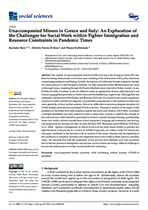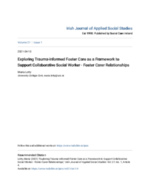Unaccompanied Minors in Greece and Italy: An Exploration of the Challenges for Social Work within Tighter Immigration and Resource Constraints in Pandemic Times
Through an analysis of the impact of the pandemic on the Italian and Greek reception systems and social interventions with unaccompanied minors (UAMs), the authors of this study utilised a multiple embedded case study approach within a comparative analysis, to identify key changes in the main services which should be guaranteed to minors—namely, hosting/housing, guardianship, foster care, family/relatives reunification, school integration, language, job training for care leaving, and preparation for leaving care after 18 years.




